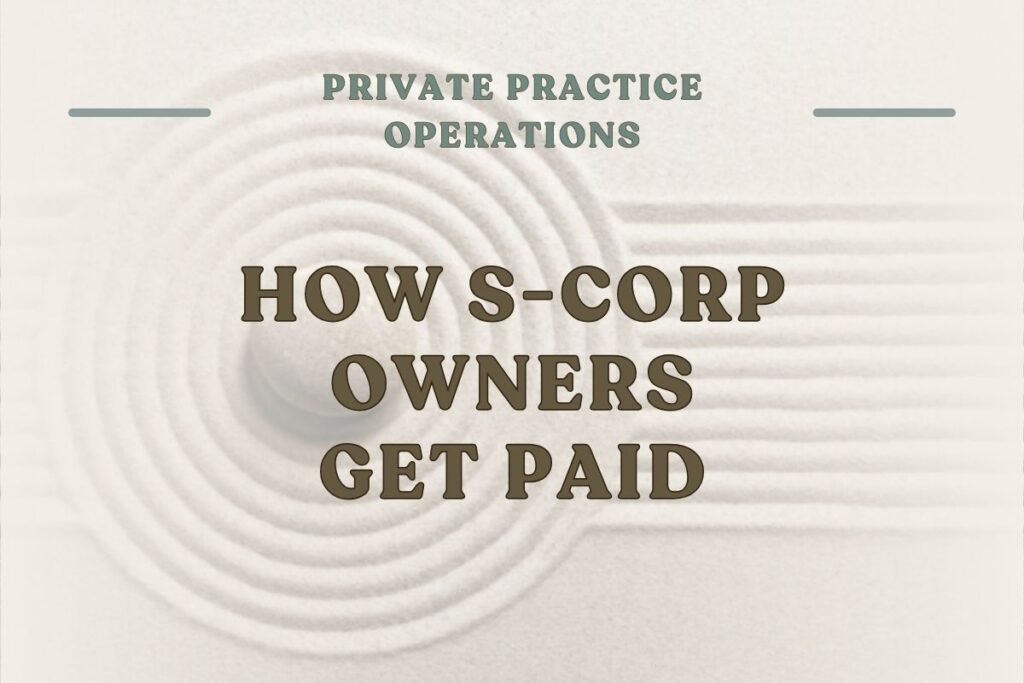How to Pay Yourself in Private Practice

Key Takeaways:
- S-Corp owners must pay themselves a “reasonable salary” to comply with IRS requirements
- Distributions allow S-Corp owners to withdraw business profits without paying payroll taxes
- Balancing salary and distributions is key to maximizing tax advantages
- Salary benefits include tax withholding and compliance, but requires payroll taxes
- Distributions can be taken anytime and avoid payroll taxes, but require separate tax planning
- Working with a CPA familiar with private practice is crucial for optimizing compensation
As you may have read in other articles, S-Corporations are typically the best option for private therapy practices. The general idea is that S-Corps incur less tax to the practice owner, but they do come with some added complexities.
The biggest change that practice owners will experience when electing to be an S-Corp is how they pay themselves.
Unlike LLCs or Sole Proprietorships, S-Corps are required by the IRS (IRS website) to pay their owners a “reasonable salary.” We will break down what “reasonable” means in another article, but for now, we will just focus on the fact that S-Corp owners are actually going to be getting a paycheck from their business, just like any other employee of the practice.
And in addition to a salary, S-Corp owners can also simply transfer money from their business bank account to their personal bank account whenever they would like. These transfers are often referred to as distributions.
Below we are going to break down the pros, cons, and nuances of each of these methods of compensation.
S-Corp Payment Method #1 – Salary
As mentioned above, this payment method is required by the IRS. S-Corp owners have to pay themselves a reasonable salary every year that they are in business.
Benefits of Taking a Salary
- Keeps you in compliance with IRS rules
- Provides the practice owner with a regular stream of income
- Your payroll company will withhold taxes from your paycheck. Assuming you fill out your W-4 properly, this tax withholding will take a lot of pressure off your requirement to make estimated tax payments.
Drawbacks of Taking a Salary
- Payroll Taxes! By far, the biggest downside to taking payroll is the payroll taxes you must pay. As you learned in our comprehensive S-Corp vs LLC article, payroll taxes (when paid on behalf of the business owner) are the same things as self-employment taxes, which is the same thing as Social Security and Medicare. This tax is over 15% of your pay and could be as high as 20% depending on which state and city your practice is located in.
- You will also have to pay a payroll service (e.g., ADP, Gusto) to process the payroll for you. This is technically something you can do yourself to save some money, but it’s time-consuming and the stakes are high…I’m a CPA and I don’t even do my own payroll filings.
S-Corp Payment Method #2 – Distributions
So, you pay yourself a “reasonable” salary (above), and there is still money left in the business bank account. You can take that money out simply by transferring the money into your personal bank account. (Boomers, you can also write yourself a physical check if you prefer)
Benefits of Taking Distributions
No payroll taxes!!! The fact that you don’t have to pay payroll taxes on distributions is not only the biggest advantage of distributions, but also the biggest advantage of S-Corps in general. (Remember from the entity selection article, LLCs have to pay payroll tax on every dollar earned. S-Corps don’t.)
You can take a distribution whenever you’d like and for however much you’d like. We typically recommend practice owners take distributions monthly, but you can take them daily, weekly, annually, or literally any time you want.
Drawbacks of Taking Distributions
There is no tax withholding on distributions. Even though the distributions aren’t subject to payroll tax, they are still subject to income tax. And because there is no payroll company involved to withhold taxes for you, the burden falls on the practice owner to set aside tax money herself. (see our comprehensive article on the best way to save for and pay estimated taxes)
How to Optimize the Two S-Corp Payment Methods for S-Corp Owners
The salary you take is subject to payroll taxes; the distributions you take are not.
Obviously, it’s in the practice owner’s best interest to pay herself as little salary as possible. This will leave the most money in the business bank account, which can then be taken as a distribution. However, it’s vitally important to make sure the salary amount isn’t too low, otherwise you could end up in hot water with the IRS.
The key to getting this balance optimized is to work with a CPA who is not only well-versed in S-Corp compensation strategies but also familiar with the nuances of running a private mental health practice.
